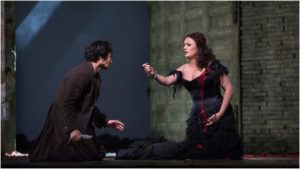
Metropolitan Opera 2018-19 Season Review: Carmen
Clémentine Margaine & Yonghoon Lee Show Strong Display In Revival Of Iconic Masterwork
By Logan MartellOn Tuesday, October 30, 2018, the Metropolitan Opera opened this season’s run of Georges Bizet’s perennial masterpiece, “Carmen.”
Making his debut with the Metropolitan was Israeli conductor Omer Meir Wellber, who is set to serve as chief conductor of the BBC Philharmonic Orchestra in 2019. Under his baton, the orchestra and experienced cast joined together in ways that put their individual talents to great use in Sir Richard Eyre’s spellbinding production.
Plucking at Heartstrings
In the title role, Clémentine Margaine was a seductive firebrand.
From her entrance in Act one, her expressions and gestures were charged with a tension well-suited to the timeless man-eater, and a number of dramatic and musical directions seemed to emphasize Margaine’s seductive quality.
While toying with Zuniga during the Habanera, Margaine boldly lowers herself into a deep squat, almost upon her knees, to brush him with the rose. While this direction lingered somewhat, easing the shock of the moment, Margaine’s portrayal strongly suggested her goal was not to shock, but to control, even with all eyes upon her.
A significant instance of this came in Act two’s “Chanson Boheme,” where the tempo of the orchestra felt relaxed, even during the animato sections of the number. The overall feeling this created was that of music which seduces the heart and body rather than seizes it with maddening rhythm, and Margaine capitalized greatly on this.
Another more sublime moment came in Act three where she joins Frasquita and Mercedes in reading their fortunes. Margaine’s dire rendition, featuring no shortage of fearful vibrato, was hauntingly appropriate for this fatalistic number.
Passion For Days
Making for a highly arresting force was Korean tenor Yonghoon Lee as Don Jose, even if his pronunciation in French was not always clear or concise. His opening exchanges with Zuniga presented a heavy voice that sounded closer to the baritone range, but with Micaela he quickly displayed a powerful, and fascinating, dramatic tenor. In their duet “Parle-moi de ma mere,” their abundant passion quickly synced, culminating in the highly-rewarding pianissimo harmony on the closing phrase “O souvenirs du pays!”
While Lee was more than capable of vocal beauty, his moments of suffering were truly something to behold and the role of Don Jose provided an abundance of them. An early example came towards the end of the first act, where after trying to endure Carmen’s seductions, Lee cried her name with a pain that made it clear he had lost before he even began negotiating for her love in exchange for her freedom.
This desperate power was explored deeper upon his return in Act two, and especially during his aria “La fluer que tu m’avais jetee,” as heard by his chilling high B-flat which concluded the phrase “De cette odeur je m’enivrais!” By the end of the night, his bursting heart turned his voice into a clarion of disaster that could be felt through the room.
Endearing the Audience
As Micaela, soprano Guanqun Yu wasted no time in endearing the audience, as heard by the bubbly tones in her “vraiment!?” soon after her appearance, and the way she innocently took up the melody sung by the guards to make a quick exit.
Her aria in Act three “Je dis que rien ne m’epouvante” was a stirring showcase of pious lyricism, and for the abundance of passion brought by the cast, Yu’s portrayal carried with it a genuine love that stood out and earned the extended applause that followed. Yu will no doubt delight audiences when she takes on the role of Donna Anna in the Metropolitan’s upcoming production of “Don Giovanni.”
Finishing up the main cast was bass-baritone Kyle Ketelsen as Escamillo. The torchlight procession seen through the broken rafters of the tavern, and the cheering entourage that approached, made for a fitting setup to his ardent toreador song “Votre toast, je peux vous le rendre.”
Here, Ketelson wove a powerful tapestry with the extended lyrics, adorning it with the bravura of his high F’s. His confrontation with Lee in the third act was well-executed and it was highly satisfying to watch their passions clash against one another. His interactions with Margaine’s Carmen suggested a love that desired to conquer the heart of the infamous gypsy, though their exchanges in the fourth act held a more loving atmosphere.
Artistry in Abundance
Sir Richard Eyre’s production of “Carmen” is praiseworthy for its ability to conjure meaning through the staging and its highly physical directions. Highlights of this included Carmen’s dance for Jose in the second act, where Margaine spins a piece of her garment as a bullfighter would his cape; this made for a powerfully ironic connection with the final scene that connects the murdered Carmen with the slain bull in the ring.
Smaller choices, such as the way Carmen’s dress swept up the rose petals on the floor outside the stadium, were visually appealing as well.
That isn’t to say that it was a perfect night. There were moments where it was clear musically and dramatically that more rehearsal time was needed as some of the duets featured moments where singers weren’t together. But this is likely to develop and improve with more performances on the way.
For Margaine, there will be well over a dozen performances this season, including one that will be part of the Live in HD presentation in February.


